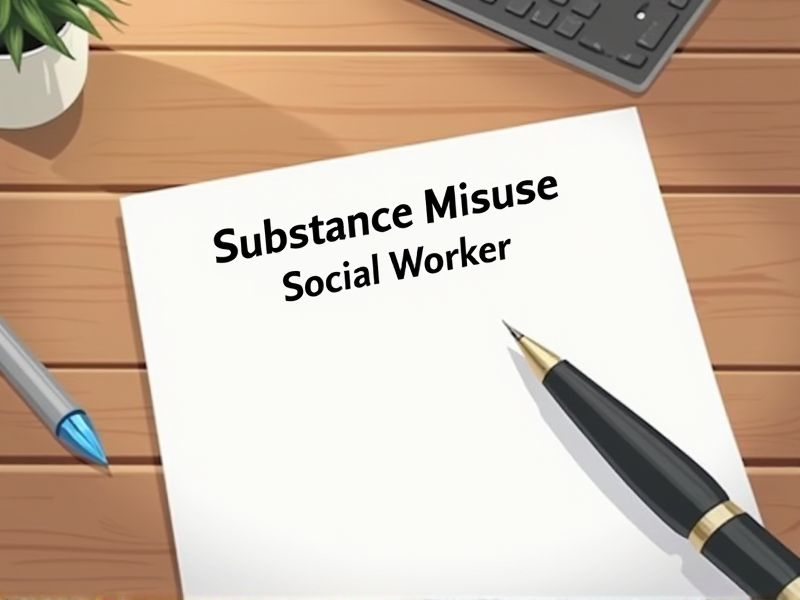
Substance Misuse Social Workers face complex challenges that require specialized knowledge and skills to effectively support individuals battling addiction. Certain certifications equip these professionals with the necessary expertise in therapeutic interventions, legal regulations, and case management. These credentials ensure compliance with industry standards and enhance their capability to provide comprehensive care. Some important certifications for a Substance Misuse Social Worker include those focused on addiction counseling and mental health assessment.
Licensed Clinical Social Worker (LCSW)
Licensed Clinical Social Workers (LCSWs) provide specialized expertise in addressing the complexities of substance misuse, combining clinical skills with a deep understanding of social factors affecting individuals. Their professional training equips them to conduct assessments, develop treatment plans, and provide therapeutic interventions tailored to the unique needs of those struggling with addiction. LCSWs play a critical role in navigating the healthcare system, ensuring clients access necessary resources and support networks. The LCSW credential assures a level of competence and credibility that is crucial for effective intervention in substance misuse cases.
Licensed Master Social Worker (LMSW)
Licensed Master Social Workers (LMSWs) provide specialized training in complex issues, making them essential in addressing substance misuse. Their expertise in assessment and treatment planning helps identify underlying causes of addiction. LMSWs are skilled at providing therapeutic interventions, promoting recovery and relapse prevention. They navigate healthcare systems effectively, ensuring clients access comprehensive services.
Certified Alcohol and Drug Counselor (CADC)
The presence of a Certified Alcohol and Drug Counselor (CADC) in a Substance Misuse Social Work setting enhances the quality of care through specialized knowledge of addiction therapy. With CADC expertise, social workers can better identify and address the underlying causes of substance misuse, leading to more effective intervention strategies. CADCs provide evidence-based approaches that improve clients' recovery outcomes by applying tailored treatment plans. Certification ensures a standard of practice, instilling trust and credibility among clients and stakeholders in the substance misuse recovery process.
Certified Substance Abuse Counselor (CSAC)
A Certified Substance Abuse Counselor (CSAC) provides specialized knowledge crucial for a Substance Misuse Social Worker to effectively diagnose and treat individuals with addiction issues. CSACs possess training that ensures compliance with industry standards, directly impacting the quality of care provided. Their expertise helps in developing evidence-based intervention strategies, enhancing treatment outcomes. They also offer credibility and trust, influencing client engagement and success rates in recovery programs.
Certified Addiction Specialist (CAS)
Substance misuse social workers often encounter complex cases where clients display multifaceted addiction patterns. The Certified Addiction Specialist (CAS) credential equips them with advanced skills and knowledge to assess addiction severity effectively. This specialization allows for implementing evidence-based interventions tailored to individual needs. Social workers with CAS certification are more adept at integrating comprehensive treatment plans, leading to improved client outcomes and reduced relapse rates.
Motivational Interviewing Certification
Motivational Interviewing Certification equips substance misuse social workers with evidence-based techniques to effectively engage clients resistant to change. The certification process enhances a social worker's ability to foster intrinsic motivation, which is crucial for clients struggling with addiction. Training in motivational interviewing improves communication skills, leading to better client outcomes and therapeutic rapport. Data shows that social workers with this certification are often more successful in helping clients achieve and maintain sobriety.
Certified Recovery Coach (CRC)
Substance misuse social workers often encounter complex cases requiring specialized knowledge, and a Certified Recovery Coach (CRC) provides targeted strategies for effective recovery. A CRC can bridge gaps in traditional therapy by offering peer-driven support, which is essential for individuals struggling with addiction. Training in CRC methods equips social workers with tools to enhance client motivation and sustain long-term recovery goals. The integration of a CRC in social work practice fosters a supportive environment that is crucial for successful relapse prevention.
Mental Health First Aid Certification
Substance misuse social workers often encounter clients struggling with both addiction and mental health issues, making Mental Health First Aid Certification crucial. This certification equips them to effectively recognize mental health crises, which frequently co-occur with substance misuse. It enhances their ability to provide appropriate immediate support, reducing the risk of harm. Acquiring this certification can lead to more comprehensive care and better outcomes for clients.
Trauma-Informed Care Certification
Trauma-Informed Care Certification equips substance misuse social workers with the understanding needed to recognize and address the impact of trauma on individuals. Recognizing trauma's role in substance misuse leads to more empathetic and effective treatment strategies. Certified social workers can create safer and more supportive environments for recovery, fostering trust and openness. Enhanced knowledge from certification reduces the risk of re-traumatization during treatment, promoting more sustainable recovery outcomes.
Certified Clinical Mental Health Counselor (CCMHC)
Certified Clinical Mental Health Counselors hold specialized training that enhances their ability to assess and address complex mental health issues, which is crucial for effectively supporting individuals with substance misuse disorders. Their expertise in evidence-based therapeutic techniques directly contributes to improved treatment outcomes for clients struggling with addiction. CCMHCs bring a deeper understanding of co-occurring mental health disorders that often accompany substance misuse, ensuring comprehensive care. Their certification fosters trust and credibility among clients and interdisciplinary teams, enhancing collaboration and treatment efficacy in substance misuse settings.
Summary
As a substance misuse social worker, gaining certifications can enhance your credibility and open new career opportunities. Specialized training can improve your skills in client assessment and intervention, leading to more effective support for individuals struggling with addiction. This expertise often results in higher client satisfaction and better recovery outcomes. Certifications can also position you for potential salary increases and leadership roles within your organization.
